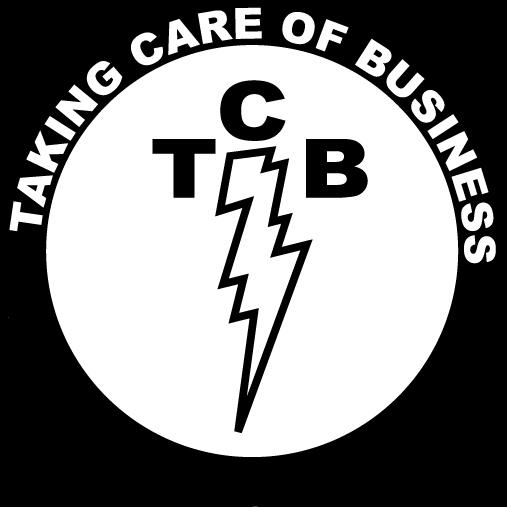


Elvis In The Army
By December of 1957, Elvis Presley was twenty-three years old, healthy, rich, and more famous than he could 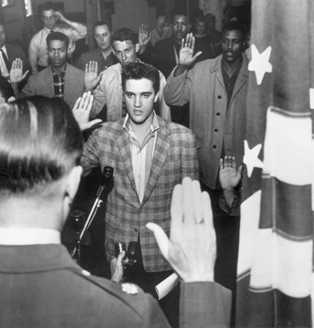 ever dreamed. Everything he touched turned to gold. It was as if nothing could get in his way. That is, until December 10, 1957, when Elvis received a letter from the Memphis Draft Board notifying him that he was up for the next millitary draft. Army, Navy, and Air Force recruiters immediately called to offer him special enlistment opportunities if he signed up before being drafted. The Navy even offered to form an "Elvis Presley Company" that would include soldiers from the Memphis area. Elvis declined all the enlistment offers and decided to take his changes with the draft. On December 19, nine days after he received his initial draft notification, Elvis got final word from the Memphis Draft Board; he was to reort for induction into the Army on January 20, 1958, the very same day he was scheduled to start filming King Creole. Things suddenly got very quiet around Graceland. Elvis was sure that after two years in the Army and being out of the public eye his career would be over. Hal Wallis and Paramount were equally distressed about Elvis being drafted. They had already invested $350,000 in King Creole and were now faced with the possibillity of shelving the project, if not canceling it entirely. Wallis and Colonel Parker contracted the Memphis Draft Board, requesting a deferment until March 20, when shooting of the film would be complete. The Draft Board had alredy been deluged by letters from angry fans who saw the conscription as a government attempt to sabotage Elvis's career. They argued that Elvis Presley was a national treasure and therefore should be exempt from the draft. The president himself ecen received letters regarding the "Elvis Presley draft situation."
ever dreamed. Everything he touched turned to gold. It was as if nothing could get in his way. That is, until December 10, 1957, when Elvis received a letter from the Memphis Draft Board notifying him that he was up for the next millitary draft. Army, Navy, and Air Force recruiters immediately called to offer him special enlistment opportunities if he signed up before being drafted. The Navy even offered to form an "Elvis Presley Company" that would include soldiers from the Memphis area. Elvis declined all the enlistment offers and decided to take his changes with the draft. On December 19, nine days after he received his initial draft notification, Elvis got final word from the Memphis Draft Board; he was to reort for induction into the Army on January 20, 1958, the very same day he was scheduled to start filming King Creole. Things suddenly got very quiet around Graceland. Elvis was sure that after two years in the Army and being out of the public eye his career would be over. Hal Wallis and Paramount were equally distressed about Elvis being drafted. They had already invested $350,000 in King Creole and were now faced with the possibillity of shelving the project, if not canceling it entirely. Wallis and Colonel Parker contracted the Memphis Draft Board, requesting a deferment until March 20, when shooting of the film would be complete. The Draft Board had alredy been deluged by letters from angry fans who saw the conscription as a government attempt to sabotage Elvis's career. They argued that Elvis Presley was a national treasure and therefore should be exempt from the draft. The president himself ecen received letters regarding the "Elvis Presley draft situation."
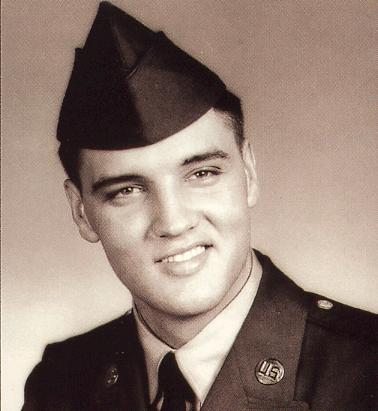 In order to ebb the tide of criticism, the draft board agreed to grant Elvis a sixty-day deferment. Elvis went to Hollywood in January to film King Creole as planned. On March 24, 1958, Elvis reported to Local draft Board 86 to begin his service in the United States Army. The enlistment process turned into a media circus, instigated no doubt by Colonel Parker. Dozens of reporters and photographers as well as a film crew were there to document the historic event. Flash bulbs popped constantly as Elvis went from station to station. He was asked questions, examined, tested, issued his equipment, and designated his serial number-53310761. He then boarded a bus for Fort Chaffee, Arkansas, to continue the processing.
In order to ebb the tide of criticism, the draft board agreed to grant Elvis a sixty-day deferment. Elvis went to Hollywood in January to film King Creole as planned. On March 24, 1958, Elvis reported to Local draft Board 86 to begin his service in the United States Army. The enlistment process turned into a media circus, instigated no doubt by Colonel Parker. Dozens of reporters and photographers as well as a film crew were there to document the historic event. Flash bulbs popped constantly as Elvis went from station to station. He was asked questions, examined, tested, issued his equipment, and designated his serial number-53310761. He then boarded a bus for Fort Chaffee, Arkansas, to continue the processing.
Newspapers immediately announched the downfall of Elvis Presley. They predicted that two years out of the limelight was too much for even Elvis to overcome. Suddenly, his income was cut from $400,000 to $78 a month. Although Elvis tried to take evrything in stride, deep down he was afraid for his career. Elvis knew his fans were dedicated, but two years seemed like an awfully long time to wait. Colonel Parker, however, knew better. Elvis had plenty of recorded material that had not yet been re-released, as well a lot of material recorded at Sun that was still to be re-released. If RCA spaced out the releases properly, there would be more than enough to keep Elvis on charts while he was in the Army. Colonel Parker quickly put his promotional machine in motion. If anything, Elvis joining the Army was a public-relations boon. He could now be seen as a patriotic young man who would willingly serve his country with great pride. Nearly everybody thought that Elvis would request the Special Services Branch of the Army. Indeed, the Army hierarchy was hoping that that would be the case. In the Special Services, Elvis could sing his way through his service as well as appear on print and television commercials to help the Army boost enlistment.
At Parker's insistence, however, Elvis turned down Special Services and announched that he did not want any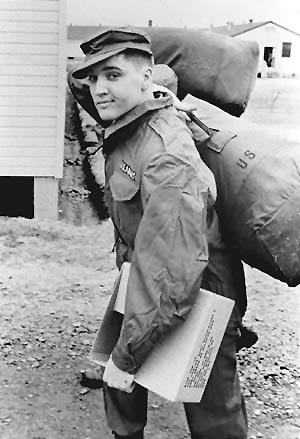 special treatment. Parker knew that if Elvis went through basic training, carried his own gear and rifle, marched, and went on guard duty, all just like a normal soldier, that it would help his public image.
special treatment. Parker knew that if Elvis went through basic training, carried his own gear and rifle, marched, and went on guard duty, all just like a normal soldier, that it would help his public image.
Instead of Special Services, Elvis was assigned to a Company, Second Medium Tank Battalion, Second Armored Division. After four days of processing at Fort Chaffee, Elvis was shipped to Fort Hood, Texas, to begin basic training. According to Elvis, he was kidded and chided quite a bit by his fellow soldiers at the beginning of boot camp; however, once they saw that he didn't expect to be treated any differently and that he was just another grunt, they soon grew to like him.
While he was stationed at Fort Hood, the Army allowed Elvis to live off base with his parents and his grandmother, Such as practice was not unusual for a soldier with a dependent family. The Presleys originally lived in a trailer, but later moved into a four-bedroom house at 605 Oak Hill Drive in Killeen, Texas. While Elvis was in the middle of basic training, Gladys grew increasingly ill. She tried to hide her illness from her family until Vernon came home one day and found her collapsed on the kitchen floor. After seeing a doctor, it was agreed that Gladys would go back to Memphis and check into a hospital for tests. Gladys had not been very healthy for some time now. She had always dreamed of the best for Elvis and wanted his singing career to take off. However, as his popularity grew, he was home less and less, and Gladys sank into depression. To deal with her loneliness and fears, Gladys drank heavily while Elvis was away, and even began taking diet pills in order to loose weight.
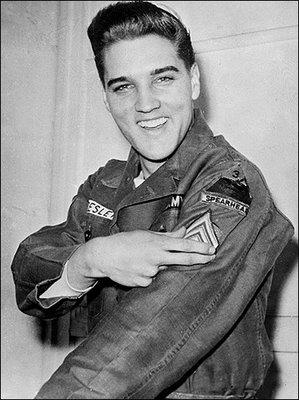 Gladys Love Smith Presley died at 3:00 a.m. on August 14, 1958 of a heart attack. She was forty-six years old. In September, 1958, Elvis Presley and the 1,400 other members of his company boarded a train to New York, where they were to have a brief layover before being shipped off to West Germany, where Elvis would finish the final year and a half of his service. As had become commonplace, the train was greeted by throngs of fans, reporters, and photographers. An Army band played "Hound Dog" and a press conference was held.
Gladys Love Smith Presley died at 3:00 a.m. on August 14, 1958 of a heart attack. She was forty-six years old. In September, 1958, Elvis Presley and the 1,400 other members of his company boarded a train to New York, where they were to have a brief layover before being shipped off to West Germany, where Elvis would finish the final year and a half of his service. As had become commonplace, the train was greeted by throngs of fans, reporters, and photographers. An Army band played "Hound Dog" and a press conference was held.
On September 22, Elvis and his fellow soldiers were shipped out of the Brooklyn Navy Yards aboard the USS General Randall, bound for Bremerhaven, West Germany. On the eve of their departure, Elvis was promoted to Private First Class. Unbeknownst to Elvis, he was nearly as popular in West Germany as in the United States. In fact, he had looked forward to his foreign service to provide a break from the media scrutiny and fan obsession. Peace and quiet were not to be found, however. Nearly 2,000 screaming German fans greeted the USS General Randall when it docked in Bremerhaven on October 1st.
As in Texas, Elvis was permitted to live off base with his family. He rented a modest four-bedroom, two-story 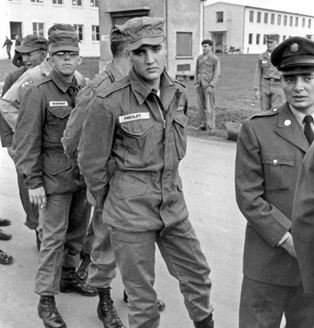 house in Bad Nauheim where he lived with Vernon, his grandmother Minnie Mae, as well as a few members of the Memphis Mafia.
house in Bad Nauheim where he lived with Vernon, his grandmother Minnie Mae, as well as a few members of the Memphis Mafia.
Elvis was assigned duty as a jeep driver-the perfect assignment for a man who loved cars as much as he did. On June 14, he was rewarded for his dilligence by being promoted to Corporal.
Elvis behaved just like any other soldier, he carried a gun, and he pulled KP and guard duty. At night, however, he returned to his home in Bad Nauheim, where he invited a vast array of family, friends, and fellow soldiers over practically every night. The parties consisted mostly of a number of people just hanging out, talking, with the occasional jam session taking place. On one such night late in 1959, one of Elvis's army buddies, U.S. Airman Currie Grant, brought over a young girl named Priscilla Beaulieu. For Priscilla, meeting Elvis Presley was a dream come true. Like millions of other teenagers, she had bought all of Elvis's records and followed his career closely in the fan magazines. Just as she became used to the idea that she was dating Elvis Presley, however, it seemed as if the whole romance would come to an abrupt end. Only a few months after they met, Elvis's tour of duty with the Army was over.
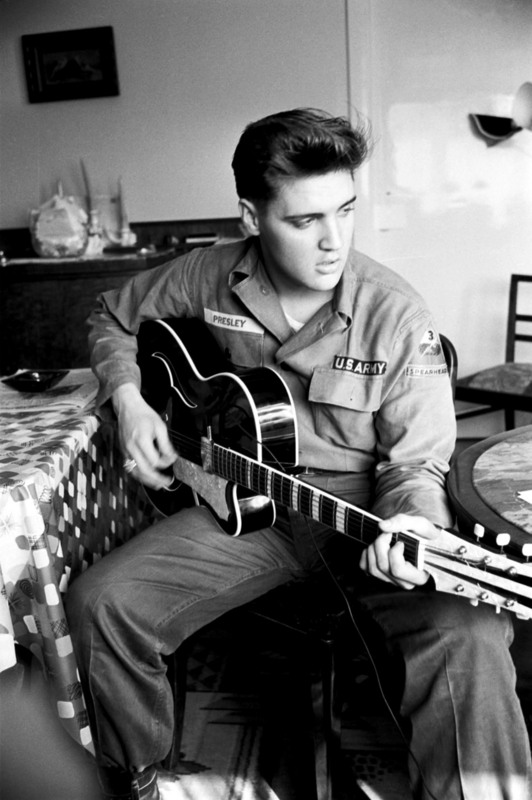
One night some military genius decided to post Elvis on guard duty. That was completely fair, of course, but also seriously dumb. Because Elvis was huge in Europe and the fans must have had some kind of radar, because whenever Elvis was exposed where the public could get him, they appeared in droves. And this night a huge crowd gathered , with Elvis doing guard duty at some gate. There he was standing like he was supposed to, but surrounded, absolutely surrounded by hundreds and hundreds of fans. It took platoons to rescue him. That was the last guard duty Elvis pulled.
(Lamar Fike)
Elvis’ army MOS was tank gunner. Which I guess, looking back, was a pretty appropriate assignment. Elvis loved guns, and these were big guns. But there was a problem, because those guns were loud. And one day Elvis came home and I asked him how it went that day and he walked rtight on past me. I followed him into the bedroom and said, “Hey, didn’t you hear me?” “What are you talking about?” Elvis answered, and I realized he hadn’t heard a word I’d said. I asked him if he was all right and he said, “My ears are ringing so loud I can’t even hear.” I immediately got Colonel Parker on the phone in the states and told him we had a problem. A big problem. Colonel Tom knew a guy at the Pentagon, and he just wore this man’s butt out until they reassigned Elvis out of that damned tank.
(Lamar Fike) 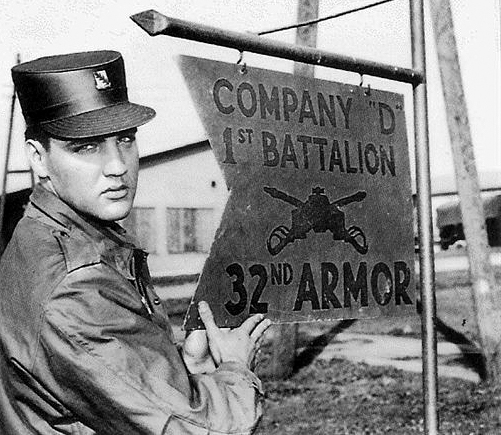
Priscilla waved a tearful goodbye to Elvis as he boarded the plane leaving Germany for the United States. Elvis searched her out of the large crowd before he got on the plane and waved to her. In the press, she became known as "the girl he left behind." When questioned at a press conference back in the States, Elvis denied that any type of romance was going on between him and Priscilla. He simply described her as a young girl he met and befriended, that it was nothing special.Well before he came home, America had already begun preparing for the return of Elvis Presley. Even though he had spent two years without making a record or a public appearance, Elvis Presley still ruled the record charts on the radio. Elvis Presley was coming home to the United States as an even bigger star than when he had left.
This site is best viewed at 1024x768 pixels



 ever dreamed. Everything he touched turned to gold. It was as if nothing could get in his way. That is, until December 10, 1957, when Elvis received a letter from the Memphis Draft Board notifying him that he was up for the next millitary draft. Army, Navy, and Air Force recruiters immediately called to offer him special enlistment opportunities if he signed up before being drafted. The Navy even offered to form an "Elvis Presley Company" that would include soldiers from the Memphis area. Elvis declined all the enlistment offers and decided to take his changes with the draft. On December 19, nine days after he received his initial draft notification, Elvis got final word from the Memphis Draft Board; he was to reort for induction into the Army on January 20, 1958, the very same day he was scheduled to start filming King Creole. Things suddenly got very quiet around Graceland. Elvis was sure that after two years in the Army and being out of the public eye his career would be over. Hal Wallis and Paramount were equally distressed about Elvis being drafted. They had already invested $350,000 in King Creole and were now faced with the possibillity of shelving the project, if not canceling it entirely. Wallis and Colonel Parker contracted the Memphis Draft Board, requesting a deferment until March 20, when shooting of the film would be complete. The Draft Board had alredy been deluged by letters from angry fans who saw the conscription as a government attempt to sabotage Elvis's career. They argued that Elvis Presley was a national treasure and therefore should be exempt from the draft. The president himself ecen received letters regarding the "Elvis Presley draft situation."
ever dreamed. Everything he touched turned to gold. It was as if nothing could get in his way. That is, until December 10, 1957, when Elvis received a letter from the Memphis Draft Board notifying him that he was up for the next millitary draft. Army, Navy, and Air Force recruiters immediately called to offer him special enlistment opportunities if he signed up before being drafted. The Navy even offered to form an "Elvis Presley Company" that would include soldiers from the Memphis area. Elvis declined all the enlistment offers and decided to take his changes with the draft. On December 19, nine days after he received his initial draft notification, Elvis got final word from the Memphis Draft Board; he was to reort for induction into the Army on January 20, 1958, the very same day he was scheduled to start filming King Creole. Things suddenly got very quiet around Graceland. Elvis was sure that after two years in the Army and being out of the public eye his career would be over. Hal Wallis and Paramount were equally distressed about Elvis being drafted. They had already invested $350,000 in King Creole and were now faced with the possibillity of shelving the project, if not canceling it entirely. Wallis and Colonel Parker contracted the Memphis Draft Board, requesting a deferment until March 20, when shooting of the film would be complete. The Draft Board had alredy been deluged by letters from angry fans who saw the conscription as a government attempt to sabotage Elvis's career. They argued that Elvis Presley was a national treasure and therefore should be exempt from the draft. The president himself ecen received letters regarding the "Elvis Presley draft situation."  In order to ebb the tide of criticism, the draft board agreed to grant Elvis a sixty-day deferment. Elvis went to Hollywood in January to film King Creole as planned. On March 24, 1958, Elvis reported to Local draft Board 86 to begin his service in the United States Army. The enlistment process turned into a media circus, instigated no doubt by Colonel Parker. Dozens of reporters and photographers as well as a film crew were there to document the historic event. Flash bulbs popped constantly as Elvis went from station to station. He was asked questions, examined, tested, issued his equipment, and designated his serial number-53310761. He then boarded a bus for Fort Chaffee, Arkansas, to continue the processing.
In order to ebb the tide of criticism, the draft board agreed to grant Elvis a sixty-day deferment. Elvis went to Hollywood in January to film King Creole as planned. On March 24, 1958, Elvis reported to Local draft Board 86 to begin his service in the United States Army. The enlistment process turned into a media circus, instigated no doubt by Colonel Parker. Dozens of reporters and photographers as well as a film crew were there to document the historic event. Flash bulbs popped constantly as Elvis went from station to station. He was asked questions, examined, tested, issued his equipment, and designated his serial number-53310761. He then boarded a bus for Fort Chaffee, Arkansas, to continue the processing.  special treatment. Parker knew that if Elvis went through basic training, carried his own gear and rifle, marched, and went on guard duty, all just like a normal soldier, that it would help his public image.
special treatment. Parker knew that if Elvis went through basic training, carried his own gear and rifle, marched, and went on guard duty, all just like a normal soldier, that it would help his public image.  Gladys Love Smith Presley died at 3:00 a.m. on August 14, 1958 of a heart attack. She was forty-six years old. In September, 1958, Elvis Presley and the 1,400 other members of his company boarded a train to New York, where they were to have a brief layover before being shipped off to West Germany, where Elvis would finish the final year and a half of his service. As had become commonplace, the train was greeted by throngs of fans, reporters, and photographers. An Army band played "Hound Dog" and a press conference was held.
Gladys Love Smith Presley died at 3:00 a.m. on August 14, 1958 of a heart attack. She was forty-six years old. In September, 1958, Elvis Presley and the 1,400 other members of his company boarded a train to New York, where they were to have a brief layover before being shipped off to West Germany, where Elvis would finish the final year and a half of his service. As had become commonplace, the train was greeted by throngs of fans, reporters, and photographers. An Army band played "Hound Dog" and a press conference was held. house in Bad Nauheim where he lived with Vernon, his grandmother Minnie Mae, as well as a few members of the Memphis Mafia.
house in Bad Nauheim where he lived with Vernon, his grandmother Minnie Mae, as well as a few members of the Memphis Mafia. 
